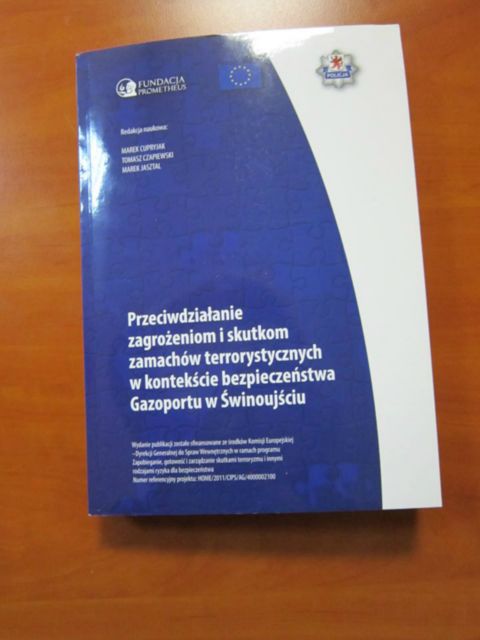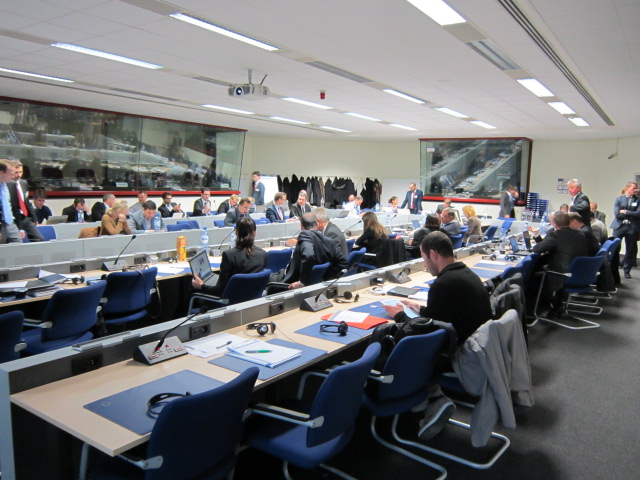About the project
On 1st September 2012 Provincial Police Headquarters in Szczecin have started the realization of “The Prevention and Management of Consequences of Terrorism in the LNG Terminal in Swinoujscie as an Element of Baltic Sea Region Security” project (acronym: SECURE BALTIC SEA REGION). The project is being implemented in partnership with Regional Development Foundation “Prometheus”.
The project received a financial support from European Commission in the amount of 126 654,21 EUR (the total project worth amounts to 140 726, 89 EUR) from the “PREVENTION, PREPAREDNESS AND CONSEQUENCE MANAGEMEN OF TERRORISM AND OTHER SECURITY RELATED RISKS” (acronym: CIPS) Programme.
LNG Terminal in Swinoujscie – key critical infrastructure
Activities planned within the project will concentrate mainly on the security of LNG Terminal in Swinoujscie.
LNG in Swinoujscie is a key element of the whole package of investments and economical, political and financial projects, which are supposed to built energy security of Poland.
An initial reloading capacity of the Terminal was 5 billion cubic meters per annum, i.e. approximately one third of gas usage in Poland. After another gasholder is built the capacity will be increased to 7,7 billion cubic meters.
Investments are part of EU strategy to built an integrated transfer system in this part of Europe, so called North-South Gas Corridor. It assumes to connect the LNG Terminal in Swinoujscie, through South Poland, Czech Republic, Slovakia, Hungary with the Adria LNG in Croatia and possibly Nabucco LNG Terminal. The project will enable to increase the security of LNG supply in this part of Europe.
National and European law treat the Terminal as a “critical infrastructure”.
Polish law on crisis management (Dz.U. from 21st May 2007) gives the definition of critical infrastructure:
“The term critical infrastructure relates to systems and objects (including building structure), devices, installations, services key to national and civil security, assuring efficient operation of public administration, institutions and entrepreneurs. Critical infrastructure encompasses: energy and fuel supply systems; communication and IT nets; financial systems; food and water supplies; health services; transport, communication, emergency systems; systems enabling the continuity of proceedings of public administration; production, storage and usage of chemical and radioactive substances, including pipelines of hazardous substances”.
The project supplements supranational activities and is connected with creation of security plans and standards of behaviour in situations of direct terrorist attacks threat.
The project enables to implement the Council Directive 2008/114/EC, which covers the topic of identification of European critical infrastructure. Results and standards of proceedings, which will be the effect of the project. will be afterwards available to other EU countries.
The project is important for other EU countries, as activities within the project concentrate on the security of objects of international trade and passenger traffic in Szczecin – Swinoujscie Port.
The aim of the project is to create an integrated organizational approach to increse the efficiency of the protection of objects with characteristics of a critical infrastructure – people, objects and ecosystems.
The aim is suppose to be achieved through trainings, exchange of experience and conducting of simulations of common exercises based on realistic scenarios in order to enhance coordination and cooperation between services responsible for crisis management in case of a terrorist attack in LNG Terminal in Swinoujscie.
The most important and challenging activity would cover organizing and carrying out the terrorist attack simulation. The product of this activity will be an instructional video which may be used for trainings for other police and other units responsible for crisis management.
Another important activity would cover organization of an international conference, which will be attended by (among others): Voivodeship Office in Szczecin, Maritime Office in Szczecin, the Government Centre for Security Policy, NATO, MOSG, PSP.
All activities within the project will be executed during 16 months.
The information, views and opinions expressed in this website or in any related communication or publication are those of the authors and the Commission is not responsible for the information contained therein.



